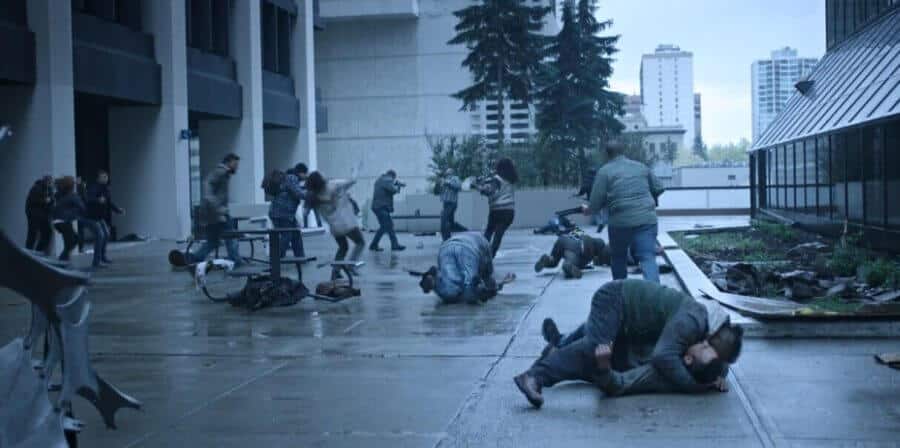
Let’s face it: America has a zombie problem. They’ve invaded our TV shows, our films, our commercials, our toy shelves, our seasonal pop-up Halloween stores, not to mention the takeover of comic-book shelves and bookstores. According to BoxOfficeMojo.com, there have been 70 zombie movies since 1980 — 23 of them since 2012.
So Black Summer, the latest horror series from Netflix, comes as something of a relief. Sure, it’s yet another homage to the flesh-eating undead. But at least it’s a fresh take on rotting corpses.
Created by John Hyams and Karl Schaefer, co-creators of Syfy’s Z Nation, Summer is supposedly a prequel to that eccentric zombie series, which was intended as a counter-punch to The Walking Dead, though Nation was canceled recently after five seasons. In truth, Netflix calls it a prequel likely to draw in the cultish fans of Nation, because the two shows share little zombie DNA. Summer is set at the onset of the apocalypse; Nation took place three years into the apocalypse. Summer takes itself (perhaps too) seriously and feasts on tension; Nation featured a zombie stripper whose arm fell off mid-dance.
Set a few months after an initial outbreak wipes out Denver, Summer thrives in the chaos of a nation that knows it is being overrun and unprepared to stop the takeover. It’s absolute mayhem when we drop into the premiere. Handheld camera operators follow survivors with long uncut shots as they creep through tunnels, break into abandoned houses and sprint down deserted streets (easily the most terrifying element of the show). If The Walking Dead is a cinematic look at the potential end of mankind, Summer is a flat-out sprint from that possibility; much of the show looks as if it were shot with GoPro cameras atop running actors.
And Summer has to capture that frenetic pacing, because character development is essentially non-existent. Instead, the story line — what little there is of one— revolves around getting from Point A (a suburb that’s been evacuated) to Point B (a sports stadium where survivors are being airlifted to safer parts of the country), and the depth of the characters goes as far as them not wanting to be eaten.
Though largely a B-list cast, Jaime King is the biggest name in the credits as Rose, a mother looking for her daughter after they get separated in the evacuation. Co-stars come and go as they get their own story threads, run away or become Lunchables.
But that is the show’s unspoken strength. Black Summer is about thrills and thrills only. No maniacal Walking Dead human villains, no abstract debates about humanity’s role the apocalypse, no absurd rules to avoid becoming a living appetizer. Summer runs solely on adrenaline and instinct; there’s no time to debate morality because survivors are dropped from one creepy situation to the next.
The downside of this is repetition, and it’s hard to see Summer aspiring to be anything beyond zombie chases and run-ins with scumbag survivors taking advantage of the chaos. One episode consists almost entirely of a foot chase with brain-eaters that has about a half-dozen words of dialogue. Deep? No. Effective? Quite.
What Summer lacks in depth it almost makes up for in structural simplicity. Each episode is presented as a series of smaller chapters, with simple title cards laid over a black screen. As we follow characters, they are constantly crossing paths with each other, so we’ll see several scenes from different perspectives as we follow the different survivors.
Episode lengths range from your standard 45-ish minutes to a mere 20 minutes — the finale, which is a descent into chaos as the city is overrun. The lack of format works here, as it nicely underscores a lack of structure in an overturned world. Government forces are impotent; survivors accidentally shoot each other; some humans are as venomous as the undead. Summer forgoes exposition for breathless escapes.
Most effective are the zombies themselves. For one, they’re fast: think 28 Days Later or World War Z over the stumbling mumblers of, say, Night of the Living Dead. And zombies don’t die with a simple head trauma. Here, creatures usually need a fusillade of automatic gunfire to be brought down.
In a sense, Summer is The Walking Dead without the bloated melodrama and pretentious blabbering (and, unfortunately, big-budget makeup and special effects). Summer is less a TV show than a sensory experience. It’s not going to redefine the zombie movie, but Summer manages to breathe some life into a genre at risk of dying out from overexposure.
